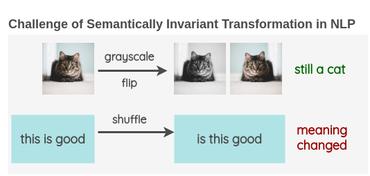Data Augmentation
2509 papers with code • 2 benchmarks • 63 datasets
Data augmentation involves techniques used for increasing the amount of data, based on different modifications, to expand the amount of examples in the original dataset. Data augmentation not only helps to grow the dataset but it also increases the diversity of the dataset. When training machine learning models, data augmentation acts as a regularizer and helps to avoid overfitting.
Data augmentation techniques have been found useful in domains like NLP and computer vision. In computer vision, transformations like cropping, flipping, and rotation are used. In NLP, data augmentation techniques can include swapping, deletion, random insertion, among others.
Further readings:
- A Survey of Data Augmentation Approaches for NLP
- A survey on Image Data Augmentation for Deep Learning
( Image credit: Albumentations )
Libraries
Use these libraries to find Data Augmentation models and implementationsLatest papers with no code
Continuous Control Reinforcement Learning: Distributed Distributional DrQ Algorithms
Distributed Distributional DrQ is a model-free and off-policy RL algorithm for continuous control tasks based on the state and observation of the agent, which is an actor-critic method with the data-augmentation and the distributional perspective of critic value function.
Offline Trajectory Generalization for Offline Reinforcement Learning
Then we propose four strategies to use World Transformers to generate high-rewarded trajectory simulation by perturbing the offline data.
Clustering and Data Augmentation to Improve Accuracy of Sleep Assessment and Sleep Individuality Analysis
Recently, growing health awareness, novel methods allow individuals to monitor sleep at home.
Classification of Prostate Cancer in 3D Magnetic Resonance Imaging Data based on Convolutional Neural Networks
Prostate cancer is a commonly diagnosed cancerous disease among men world-wide.
Awareness of uncertainty in classification using a multivariate model and multi-views
The proposed model regularizes uncertain predictions, and trains to calculate both the predictions and their uncertainty estimations.
Can We Break Free from Strong Data Augmentations in Self-Supervised Learning?
Self-supervised learning (SSL) has emerged as a promising solution for addressing the challenge of limited labeled data in deep neural networks (DNNs), offering scalability potential.
FSRT: Facial Scene Representation Transformer for Face Reenactment from Factorized Appearance, Head-pose, and Facial Expression Features
The task of face reenactment is to transfer the head motion and facial expressions from a driving video to the appearance of a source image, which may be of a different person (cross-reenactment).
Accelerating Ensemble Error Bar Prediction with Single Models Fits
Ensemble models can be used to estimate prediction uncertainties in machine learning models.
DKE-Research at SemEval-2024 Task 2: Incorporating Data Augmentation with Generative Models and Biomedical Knowledge to Enhance Inference Robustness
Safe and reliable natural language inference is critical for extracting insights from clinical trial reports but poses challenges due to biases in large pre-trained language models.
Improving Personalisation in Valence and Arousal Prediction using Data Augmentation
This paper presents our work on an enhanced personalisation strategy, that leverages data augmentation to develop tailored models for continuous valence and arousal prediction.



 CIFAR-10
CIFAR-10
 ImageNet
ImageNet
 ESC-50
ESC-50
 ImageNet-Sketch
ImageNet-Sketch
 MuST-C
MuST-C
 IAM
IAM
 PAWS
PAWS
 Clotho
Clotho
 UrbanSound8K
UrbanSound8K
 MathQA
MathQA

